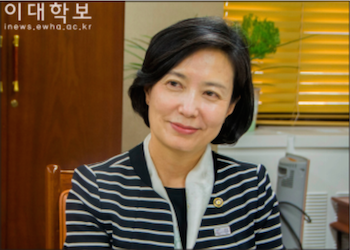Korean ministry, striving to embrace women and men alike

Ministry of Gender Equality and Family (MOGEF) specifically functions to enhance women’s rights, support family policies, and protect youth welfare. Lee Sook-jin, who was recently seated as the vice minister of MOGEF on June 13, studied her bachelor in Communication and Media and pursued masters and doctoral studies on Women’s Studies all at Ewha.
“As an undergrad at Ewha, my interest in women issues developed when I worked as a reporter at The Ewha Weekly,” Lee said. “Just when I wanted to study it more in depth, Ewha opened a masters’ course on Women’s Studies and enabled me to pursue my interests.”
How MOGEF benefits men
Since MOGEF’s establishment, its existence has been widely criticized by numerous Korean men who accused the ministry of reverse discrimination because its policies predominantly focus on women issues. Lee, however, emphasized that the ministry’s role is beneficial to all genders.
For example, MOGEF contributed in eliminating institutional losses men faced. Via Gender Impact Assessment, the ministry realized that female workers who suffer from external injuries received more financial compensated than male workers. This used to continue under the assumption that wounds damaging to one’s appearance are socially more detrimental to women than men.
“MOGEF has recently started encouraging male participation through ‘Gender Equality Voice’ project, which is like a Korean version of the U.N. Women’s HeForShe campaign,” she explained. “In a society where women face inequality, so would men. We’ve thus gathered 45 men and composed Gender Equality Voice, a diverse bunch of professionals including a cultural critic, a cartoonist, a children’s book author, a reporter and more.”
Lee noted that the hardships women face in the workforce can be alleviated while increasing men’s welfare at the same time. For instance, maternity leave is rarely put to use despite utilizing paid leave for up to a year is legally guaranteed. This is because due to cultural reasons where bosses openly discourage it. To create a friendlier atmosphere for mothers who wish to stay in the workforce, Lee stressed that more men must use parental leave.
“About 8 percent of the workers who apply for parental leave are men,” Lee noted. “This result is recently increased one. Previously, it was close to 2 percent. To encourage more men to use parental leave, we’re considering to pay up to 100 percent of replacement rate for its male users specifically,” Lee said.
Lee emphasized that gender equality fits everyone’s interests.
“MOGEF doesn’t exist purely for women’s interests but contributes to establishing a fairer society where both women and men can live more equally,” Lee added. “We only hope more men will view our works with open hearts and realize that the ministry’s work is beneficial to their rights as well.”
Women in the workforce
Lee was a Ewha student when she first witnessed the naked truth of women’s condition in the workforce. Since then, her interest especially focused on women labor.
“After Korea shifted to concentrate on service industry, women have been driven to ‘pink collar’ positions where they worked as cashiers, for instance, rather than at more professional jobs,” Lee noted. “Korea has an especially high rate of female part-time workers where the job is unstable and inadequate treatment is a norm. Whether part-time position is actually preferred by women or that it should be expanded is viewed critically under women labor perspective.”
Lee further explained that occupational sex segregation is a big reason why women tend to earn considerably less than men.
“Low wage is easily found in women-centric occupations as opposed to male-dominant occupations,” she said. “We must change the social structure where women are driven to low paying jobs and wage level gets lowered at a female-dominant field.”
According to Lee, such segregation was apparent even among government ministers where female ministers were rarely found apart from MOGEF.
“President Moon Jae-in was promised to comprise 30 percent of his cabinet with women and slowly raise it up to 50 percent by the end of his administration,” Lee added. “Since then, female ministers are seen at Ministry of Labor, Ministry of Foreign Affairs, Ministry of Land, Infrastructure, and Transport, Ministry of Environment, and more. President Moon’s determination is noticeable in public sector and I hope that this phenomenon spreads to the private sector as well.”
As well as having women as the head of organizations, Lee emphasized the importance of keeping women who wants to continue working in the workforce and of raising the “M Curve” where great number of women in their late 30s suddenly exit workforce due to marriage and pregnancy.
“We have ‘Women Saeil Center’ (translated as Women Newly Working Center) for those reentering the workforce,” Lee said. “The center not only provides vocational training and connects women with good jobs, but also examines female workers’ actual concerns and working experiences to figure out tangible solutions.”
Lee left hopeful messages for Ewha students who must inevitably face sexual discrimination.
“Ewha is a special society because it is consisted solely of women; the entire decision making process and leader positions are made up by women whereas in co-ed schools, leaders are predominantly older male students discharged from the army,” she said. “You are privileged to be participating in a more equal society early on. I hope students use this experience to realize the role you could play as a female citizen and actively intervene in social injustice.”

